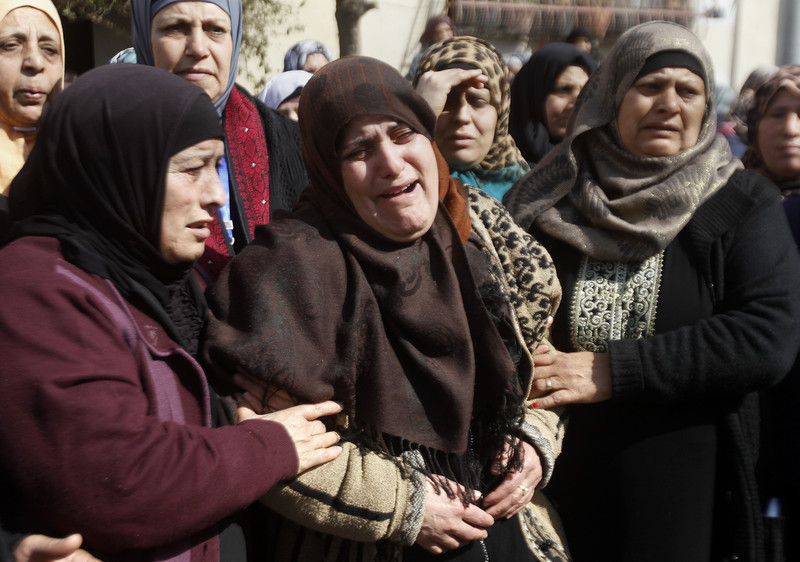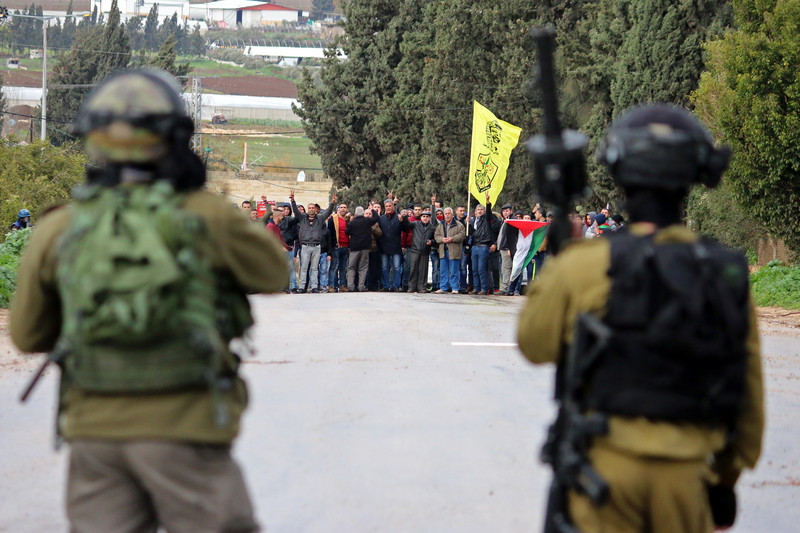
Two Palestinian children were shot dead by Israeli forces in the occupied West Bank this past week as a United Nations human rights investigator called on Israel to investigate its excessive use of force against Palestinians.
The special rapporteur Makarim Wibisono “also told Israeli authorities to charge or release all Palestinian prisoners being held under lengthy administrative detention, including children,” Reuters reported, referring to Israel’s widespread practice of holding Palestinians without charge or trial under military court orders.
Wibisono made his remarks during his final report to the UN Human Rights Council on Thursday. The Indonesian diplomat resigned from his post last month because he said Israel would not give him access to the areas he was assigned to monitor.
Israel’s foreign ministry accused the investigator of “flagrant anti-Israel bias” and rejected the findings of his report.
Quartet’s “serious concern”
The Quartet, the ad hoc group of representatives of the UN, EU, the United States and Russia that purports to manage the “peace process,” also expressed its “serious concern” on Friday.
Condemning “all acts for terror,” the group “called upon all parties to reject incitement and actively take steps to de-escalate the current tensions” and declared its intent to prepare a report with recommendations towards “the best way to advance the two-state solution.”
The anodyne Quartet statement echoed the one it issued, on the eve of the current phase of escalated direct confrontation beginning last October, during which nearly 30 Israelis and more than 160 Palestinians have been killed.
Most of those Palestinians killed, including 25 children, were shot dead during what Israel says were attacks – usually incidents of car-ramming or stabbing at West Bank settlements and checkpoints. Dozens of others were killed while participating in demonstrations or being in the vicinity of protests in both the West Bank and Gaza Strip.
Human rights groups have criticized Israel for using unwarranted lethal force against alleged attackers, saying that many such incidents amount to extrajudicial executions.
In other cases, Palestinians may not have been attempting any attack when they were slain.
Children shot dead
In the absence of accountability, expressions of concern like those made by the Quartet will do little to halt Israel’s use of deadly force, which claimed two more children’s lives in the southern West Bank in recent days.
On Tuesday, 16-year-old Omar Yousef Madi al-Jawabreh was slain by a bullet when Israeli soldiers fired on youths who were throwing stones at the invading forces in Arroub refugee camp near Hebron.
Another boy, 14-year-old Haitham Saada, died after he was hit by two bullets fired by soldiers near the entrance to Halhoul village, also near Hebron.

The army said that the boy was preparing to throw a Molotov cocktail at soldiers when he was killed.
“Other than Haitham’s younger cousin, Wajdi, who was also in his class and was with him when he died, and the soldiers, of course, there are no eyewitnesses who can relate what happened and why Haitham was shot and killed,” the Tel Aviv newspaper Haaretz reported.
“Wajdi was arrested on the spot and is still incarcerated in Ofer Camp, near Ramallah. He has not been allowed visitors.”
Collective punishment
Meanwhile, the Palestinian human rights group Al-Haq accused Israel of collective punishment after its forces imposed military closure on the northern West Bank town of Qabatiya.
The lockdown came after three young men from the town were killed during an armed attack in Jerusalem on 3 February during which a Border Police officer was slain.
During the three-day military operation in Qabatiya, Israeli forces raided the homes of the three young men, interrogated their parents and measured the houses in preparation for demolition. Other homes were raided, and 15 residents were arrested. At least 20 were injured during confrontations with soldiers.

Also this week, an Israeli settler was arrested after allegedly throwing an axe into the window of a vehicle being driven by a Palestinian east of the West Bank city of Qalqiliya and two Palestinian girls were detained by Israeli forces on suspicion of attempting to carry out separate stabbing attacks in Jerusalem and Hebron.
Also this week, two Palestinian girls with Israeli citizenship, both aged 14, were indicted on charges of attempted murder after allegedly stabbing a security guard at a bus station mall.
Israeli police spokesperson Micky Rosenfeld “shared a photo on social media following the incident of two kitchen knives scattered amongst school papers at the scene of the incident,” the Ma’an News Agency reported, adding that “The knives appeared to be clean, with no signs of blood.”
Israel brought charges of attempted murder against two other Palestinian children, aged 14 and 16, after they allegedly “attacked four young Jews from behind” at Jerusalem’s Damascus Gate last month, lightly wounding a 17-year-old US citizen “who had just moved to Israel to join the army,” according to Haaretz.
“The indictment alleged that the two carried out the attack after having watched video of Israeli soldiers degrading Palestinian women,” the newspaper reported.
“Culture of death”
Israeli Prime Minister Benjamin Netanyahu has repeatedly blamed Palestinian incitement for the surge in deadly violence, asserting this week that “Terror is not a result of occupation” and instead “stems from a culture of death.”
Israel’s military and intelligence agencies have been unable to prevent attacks waged by Palestinians independent of command from any armed group.
Israel’s domestic spy agency, the Shin Bet, distributed a poster in an East Jerusalem village last week warning parents to prevent their children from being brainwashed and led to carry out attacks.
“The poster calls on parents to keep track of their children’s activities and behavior, and to check their Facebook profiles and the content they are exposed to. It also tells them to prevent youngsters from watching Al-Aqsa TV (the Hamas-run television channel) and similar programs ‘that brainwash the children of the next generation,’”Haaretz reported.
“Shin Bet coordinators and police intelligence officers in Jerusalem occasionally use notices in order to pass on messages to residents. Usually, however, these posters are quickly torn down by locals,” Haaretz added.
Meanwhile, on Tuesday, Israel’s parliament, the Knesset, summoned members of the Foreign Press Association over “biased coverage” of recent developments.
“Parliamentary subcommittee hearings that start from the premise that the foreign media are biased tend to look like poorly conceived witch hunts,” the press association retorted.
Source: The Electronic Intifada
Click below for out latest interview with Julia Tourianksi from Brave The World
Subscribe to our YouTube channel

